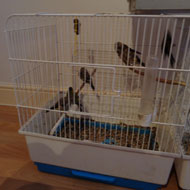
Fifteen birds found in cramped cages
A man has been fined for illegally trapping and keeping wild birds after 15 birds were found at his home in Kent, along with various tools to suggest he was trapping the birds himself.
Kent Police officers and RSPCA inspectors visited the home of Frantisek Fercak, 40, at Albion Terrace, Gravesend, on 8 September 2017. They found 13 live goldfinches kept in tiny cages, as well as one siskin and a dead goldfinch.
“These wild birds can’t cope in captivity and become very distressed being shut in cages,” said RSPCA inspector Cliff Harrison, who led the investigation into Mr Fercak. “They don’t understand the concept of being confined and, tragically, they often die.”
The surviving birds were removed and later released back into the wild.
Inspectors also found tools, including a bird feeder coated in glue, at Mr Fercak’s home.
“A bird feeder in the garden as well as things attached to the seed holders were covered in a glue-like substance,” inspector Harrison added. “This is a tactic we’ve seen before by bird trappers who are trying to attract the birds to food and then capture them.”
According to inspector Harrison, Mr Fercak claimed the birds were his and had been brought to the UK from his native country, Czech Republic.
There was also an open tube of rodent glue nearby. Mr Harrison said the RSPCA “has real concerns” about such products “as they can be extremely painful and distressing for animals who get stuck in them, and can cause them to die slow, agonising deaths”.
Mr Fercak appeared at Chatham Magistrates’ Court on Monday, 11 December, where he pleaded guilty to five offences under the Wildlife and Countryside Act 1981, according to the RSPCA. He was fined a total of £500 plus £300 court costs and a £50 victim surcharge.
Image courtesy of the RSPCA



 The RCVS has announced a new version of its 1CPD mobile app, with enhanced features for veterinary surgeons and veterinary nurses to record their continuing professional development.
The RCVS has announced a new version of its 1CPD mobile app, with enhanced features for veterinary surgeons and veterinary nurses to record their continuing professional development.